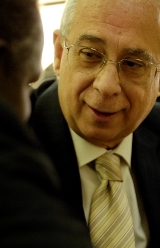Sudan pledges to cooperate in Darfur aid raises “partial” hopes
March 28, 2007 (KHARTOUM) — The Khartoum government’s latest promise of better cooperation with aid groups struggling in war-ravaged Darfur has eased the anxieties of the top U.N. humanitarian official in Sudan.

The Sudanese government, which has been accused of hindering aid work in Darfur, signed an agreement with the U.N. on Wednesday, reiterating a promise made three years ago to take “fast track” measures to remove bureaucratic obstacles obstructing the world’s biggest humanitarian effort.
Da Silva, Sudan’s U.N. humanitarian coordinator, said he was encouraged because Khartoum spelled out what actions it would take.
“It is very specific, there is no vague language. I can give examples, it says 48 hours to issue visas. Stop, all over. On stay permits, for example, stay permits for the whole period of the moratorium (on free access), instead of every three months that we have today that is always a nightmare,” he told Reuters in an interview on Wednesday.
Explaining his concerns in the sprawling United Nations building in Khartoum, Da Silva said the deal could bring “partial” relief from troubles plaguing the Darfur relief effort, which requires more than 13,000 aid workers.
“It doesn’t deal with other issues that are very important for our operation, like for example, security issues. Of course the situation in Darfur is still very dire when it comes to security issues,” he said.
WHO IS WHO?
Aside from bureaucratic hurdles, aid groups face attacks by militias and rebels, as well as bandits who thrive on Darfur’s chaos. Many workers have pulled out of areas in urgent need of humanitarian assistance.
“We don’t know who is who anymore,” said Da Silva.
“I think we need to have a political solution in Darfur that is inclusive that brings everybody to the table. By having that political solution we will get improved security.”
Recent clashes between the only Darfur rebel group to sign last year’s peace agreement with the government and Sudanese security forces that killed at least 10 people suggest that won’t be easy. The bloodshed was triggered by a traffic accident in the capital.
The former rebels have warned the peace pact could collapse if the government does not meet its demands in negotiations aimed at easing tensions after the fighting.
Experts estimate that 200,000 people have been killed and 2.5 million fled their homes since the conflict flared in 2003 when rebel groups took up arms against the government, accusing it of neglect. Khartoum says 9,000 people have died.
Darfuris say government-backed militias have killed, raped and pillaged in their villages. Khartoum says it has no ties to the militias and calls them outlaws.
U.N. officials say tribal bloodshed is now killing more people than fighting between Sudanese forces and rebels. Hundreds of people have died in the past few months.
The conflict has poured weapons into Darfur and eroded the authority of the local government, which acted as mediators between tribes, who number over 70, and are taking sides in the fighting.
Da Silva said traditional mechanisms of resolving tribal conflicts such as compensation are vanishing. Disputes which killed a few people have been replaced by heavy casualties.
“Now there are Kalashnikovs. There are heavy machine guns. There are RPGs. The father of a lady (in a dispute) goes to the other one and if he has an RPG he fires it and kills 20 people,” said Da Silva.
A special U.N. unit dedicated to monitoring tribal developments has been established.
“It is very important that this tribal conflict does not get out of hand. Most of these recent clashes are between tribes that used to be neutral in this conflict,” said Da Silva.
“The only solution is a comprehensive agreement that all ethnic groups in Darfur feel like they are a part of. It is urgent. We are running out of time.”
(Reuters)
